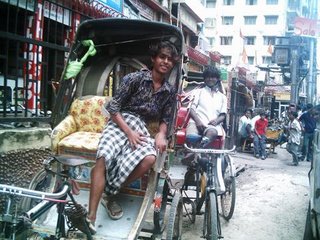
On the road again …
Cycle-rickshaw pullers are among the most vulnerable section of the urban poor. The ramshackle physical condition of the cycle-rickshaw in Calcutta – is a good indicator of the state of West Bengal under CPI(M)’s rule. Social attitudes among the Bengali middle-class can also be discerned in their interactions with rickshaw-pullers: he is spoken to as “tui” (the second person intimate, which one uses with children), as opposed to the more common “apni” (second person respectful) with which anyone, even a stranger, is addressed.
The work is very arduous and debilitating. Though the daily earning of the puller would be about Rs 100-150 ($ 2-3), they are typically addicted to gutka (tobacco), alcohol and gambling. That is the culture of the profession. It is a tough and violent life. The puller’s wife would typically be a maid-servant in a middle-class home, washing utensils and clothes, sweeping and mopping. Quite often, she is abandoned after bearing a few children. The life expectancy of a puller would be less than 50. A puller’s son – would, typically, also become a puller.
The girls / women: in this domain, at the age of 13, their whole life may be seen by an outsider as lying ahead of them. Often, by the age of 19, their whole life is actually behind them. Born to an under-nourished, under-age mother; under-nourished; married early; by 19, they may have had 2-3 children, and been left by their husbands. With little or no education or marketable skills, she is consigned to a gruelling life on the edge of penury, perpetually sickly, in low-waged servitude, merely to survive and raise her children. Her daughters - would also enter this life.
And so it goes on ...
This is the story of hundreds of thousands in the city. Adolescent girls from poor households are extremely vulnerable. But that is not something on anyone's radar, its not an issue for anyone. We see it all around us, and yet are blind to it. But actually we benefit from what exists. Its not a concern of public policy. I'm sorry, there's no 'public policy' in the first place, in this ancient civilisation. I mean where civilisation was left behind in ancient times. The Indus valley civilisation was distinguished by its focus on public matters, such as water & sanitation, hygiene, food storage, association. Now there's no "public domain".
But you would'nt know all this when you first meet them. They are up-standing human beings, with a sense of self, with a sense of dignity, aware of their equality with anybody else in a democratic society, articulate; being crushed relentlessly by life, but miraculously struggling on, waging a million tiny ineffectual mutinies to live on. Man does not live by bread alone, they say. Yes. Here, as important as bread is dignity. In big ways is that dignity assaulted. In tiny ways do they seek to salvage it.


2 comments:
Rama, you've said it. Thank you. No description of this world, by politician or poet or historian, is complete without this part of the whole, whatever it means, whatever we can do about it, whether we should be ashamed or proud that our brothers and sisters can live like this.
Indeed, this is a sad commentary on anyone who turns a blind eye to such suffering. The children are set up for failure at birth.
Here in the U.S., we do not have cycle-rickshaw pullers, but we do have people among the urban poor whose circumstances in many ways mirror those you have described. Perhaps we Americans are just better at hiding this segment of the population by sweeping them off the streets.
It is noble of you to bring public/global awareness to the disenfranchised in Calcutta.
Post a Comment